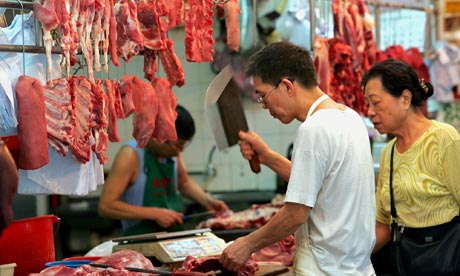Police in major crackdown on tainted meat
Updated: 2013-05-03 00:35 By Zhang Yan and Cao Yin ( China Daily)
Police have arrested 904 suspects over the past three months who are accused of manufacturing and selling 20,000 metric tons of tainted and substandard meat products, the Ministry of Public Security said on Thursday.
Since January, police have dealt with 382 major cases involving the production and processing of water-injected meat, fake beef and lamb, rotten meat, and toxic meat products, the ministry said.
The ministry in January initiated action to combat crimes relating to food safety. Over the past three months, police have cracked down on 2,010 such cases, and arrested 3,576 suspects.
They also broke up 1,712 illegal factories, workshops, and dens, and destroyed 325 cross-regional criminal networks, the ministry said.
"Food-safety crimes, especially related to meat products, are directly related to people's health and safety, so we will resolutely crack down on such crimes," ministry media officer Zhang Hongqiang said on Thursday.
Zhang said that in the past three months, officials have received lots of public reports concerning meat products, including water-injected meat, fake beef and lamb, pork from sick and dead animals, and poisonous chicken claws.
"Due to the temptation of high profits and supervision loopholes by relevant administrative sectors, food safety crimes remain severe," he said. "We will pay attention to combating crimes involving meat products reported by the public."
The ministry said the problem is not only small-scale "black workshops" with unsanitary conditions, which are engaging in the production and processing of bad meat, but also includes large-scale "black factories", which are certified for meat production but are also committing such crimes.
"Suspects tried every means to cheat the consumers, entrap the public, and severely harm people's health in order to obtain high profits," Zhang said.
For example, some suspects sold water-injected or rotten meat, and even added forbidden toxic and harmful chemicals to make the meat seem fresh, he said.
Among the cases, Liaoning police have uncovered one major toxic mutton roll case produced by Liaoning Shengtai Meat Product Processing Co, and Fujian police unearthed one major manufacturer selling pork from dead animals in Zhangzhou.
In another case, in February, Benxi police in Liaoning province unearthed one major untested frozen-beef smuggling case, and smashed four rings that were selling and storing fake frozen meat, the ministry said.
The police arrested two suspects, and seized 40 tons of fake frozen meat on the scene. Police said that since 2008, the main suspect, named Shi, always bought untested smuggled frozen meat from Guangdong province, then sold it in seven provinces, including Liaoning, Jilin and Hebei.
The amount of money involved was up to 60 million yuan ($9.74 million), the ministry said.
Yan Zhengbin, deputy director of security management bureau under the ministry, said: "We will cooperate with other authorities to target infants' dairy products, fresh milk purchase, milk power production and processing, as well as imports."
Moreover, the ministry will focus on deepening the fight against gutter oil, pork from ill and dead pigs, fake meat products, and poisonous and harmful healthcare products.
Wu Ming'an, a professor specializing in criminal law at China University of Political Science and Law, said dealing with the food safety problem requires stricter enforcement instead of legislation.
The three-month campaign seemed to get great results, but cannot tackle the crimes' root causes, he said.
Now, many administrations are involved, including public security bureaus, but every department in fact does not know its exact responsibilities, he said.
"Police cannot only focus on short-term crackdowns just because recent news like dead pigs in rivers aroused social concern," he said.
"Only when every administrator can make clear his or her duty and carry out laws strictly will the problem be alleviated."



